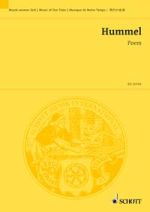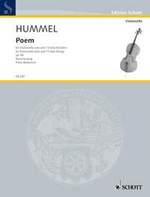Poem for Violoncello and Strings, op 80 (1984)
 |
|
First
performance: July 13, 1985, Ottobeuren, Kaisersaal
Julius
Berger / Südwestdeutsches Kammerorchester / Christoph Wyneken
Instrumentation: 8 Violins, 2 Violas, 2 Violoncelli, 1 double basse
Duration: 25 minutes
Publisher: Schott MusicED 20743 / ISMN: 979-0-001-16973-8 (study score)
CB 220 / ISMN: 979-0-001-16967-7 (piano reduction with solo part)
| Score | Piano reduction |
Video: Works by Hummel on youtube
Content
and form are taken in a subjective way from the Steps poem by Hermann Hesse.
The brief motifs that appear everywhere reflect in "magical formula script"
the parable of the Glass Bead Game, which cyclically moves from a game
with coloured beads to a game with symbols. Magic and dreams, starting out and
feelings of regret, parting and transfiguration, these are the moods, often following
one another in rapid succession - at the root of all this lies the thirst for
life and the longing for suffering and wholeness.
The work is dedicated to
Julius Berger.
Bertold Hummel
Stages
As
every blossom withers and all youth
yields to age, so blossoms each stage
of life,
so blossoms each form of wisdom and each virtue
at its own moment
and is granted only transience.
The heart, each time life calls, must
be ready for parting and new beginning,
thus, courageously and without lament,
binding itself anew elsewhere.
And in every beginning there is a magic
present,
protecting us and helping us to live.
Let us cheerfully traverse
room after room,
not holding onto any like a home,
the Spirit of the
World seeks not to chain us, limit us,
but wishes to raise us, step by step,
extend us.
Hardly do we feel at home in one stage of life,
grown accustomed
and familiar, but slackness threatens;
only he who is ready for parting and
journey
may escape the lameness of habit.
Perhaps even the hour of death
will present us with new, fresh rooms,
the call of life to us will never
cease..
Forward, then, my heart, take leave and grow strong!
from "The Glass Bead Game" with friendly permission of Suhrkamp Verlag KG, Frankfurt
Press
Memminger Zeitung, 16th July, 1985
One meets here a composer of great modesty but exuding intense artistic energy, whose "Poem" is not only based on the poem "Stages" by Hermann Hesse but also extracts from it the force of its thought and converts this into music of captivating quality. In both parts of the work, very short motifs in bold strokes dominate, moderate twelve-tone ideas set up bright lights and the old rules for the dialogue of soloist and orchestra are led to a fascinatingly modern and unusually convincing solution.
Rhein-Neckar-Zeitung, 31st May, 1986
Immediately on the heels of a very clear opening theme, which consists really only of a rising fifth leading to a richly woven sonority by means of the numerous close entries in the strings scored in a completely solo-like divisi, mysterious harmonics capture the attention of the listener. Out of the extension of the theme, a dialogue develops between the thirteen soloists of the orchestra and Julius Berger, in which demanding instrumental techniques are required from the string ensemble as well as from the solo instrument - almost excessively in the latter case. Here at the latest it is clear that the composer (as can be read in his biography) is a trained cellist! Chords, as if put together from broken glass, gripping bridge passages, solo cadenzas with iridescent sound colours: many signs of music of very subjective feelings. And in fact, the composer informs us that the work was inspired by the Steps poem by Hermann Hesse: "As every blossom withers and all youth yields to age, so blossoms each stage of life, so blossoms each form of wisdom and each virtue at its own moment and is granted only transience." Even at a first hearing, it was evident that the formal construction of the work was strongly influenced by thematic references, and even though in the second, almost rondo-like part of the work it becomes clear that the composer had carefully studied all the achievements of the avant-garde music of the sixties, the overall impression was finally dominated by lyrical cantilena, by long, flowing phrasing.
Pforzheimer Zeitung, November,1985
"The Glass Bead Game" by H. Hesse with his poem "Stages" was the conceptual starting point for the composition, which in parts led into transcendental areas and has to be felt as a Glass Bead Game in music with a mysterious and fascinating testimony.
Basler Zeitung, 1st June, 1992
The soloist and the accompanying string orchestra were moved by the same love of sensually vibrating sound, the whole work being at the same time in no sense a crudely or obviously "religious", even if the spiritual enthusiasm behind the work leaves its clear traces.
Neue Ruhr Zeitung, 12th March, 1986
With delicately woven string sounds, the Folkwang Kammerorchester under Alexander Schwink led us into a dream-world, creating a transparent setting in front of which the cellist Julius Berger (to whom the work is dedicated) could develop his full potential. In what follows, poem and music exhort to constant taking up the journey again, to a new beginning. After the doubts and hesitation of the initially disoriented cello, everything finds its resolution in a clarifying B-A-C-H (German for the notes B flat-A-C-H), for these four notes form the basis of the composition. Thus a homage to the Master is included as well.
Basellandschaftliche Zeitung, 1st June, 1992
Growing, maturing, departure from familiar surroundings are the themes; in musical terms it attained the level of highly differentiated prose. The solo passages for cello were singularly individual, the concertante work of the orchestra was unbelievably concentrated, having to produce in rapid succession the most varied moods.
Westdeutsche Allgemeine Zeitung, 10th March, 1986
One could also understand the composition as a meditation for cello. The solo instrument enters fully into constantly changing moods, speaking with eloquence partly in cantabile melody, partly in animated play of figures.

